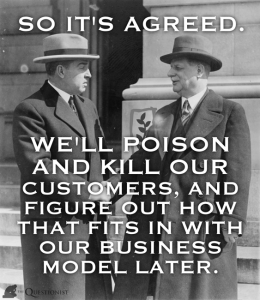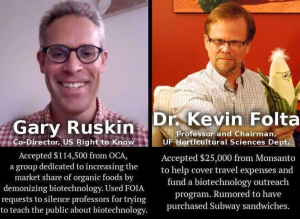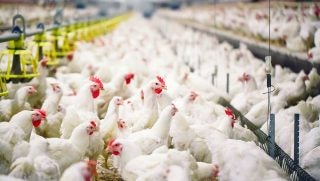Ahhhh Monsanto. One company that continually makes headlines, usually in a negative way and particularly coming from people who are not involved in agriculture.
I used to hate them. In fact, I was once an anti-GMO activist. Everything changed for me though when I started dating my farmer five years ago and started learning the truth by talking to farmers about farming. (I used to be a big-city girl.)
Here where I live in rural farm country in Iowa, Monsanto is everywhere. And that doesn’t bother us in agriculture. We can wear our Monsanto hats or coats, and no one bats an eye. We attend trade shows and conferences where Monsanto is present and no one is angry. The reality is that they make good products so farmers choose to buy them. They’re primarily an agriculture company, and focus on seeds and products that allow farmers to be more sustainable, reduce inputs, help the environment, improve yields, overcome pest pressure, the list goes on. Yet the myth is continually perpetuated that they’re an evil chemical company out to destroy humanity. This couldn’t be further from the truth, and they sold off a majority of their chemical division a couple of decades ago. This article explains it all in great detail with sources.
So where is this coming from? Sometimes when I defend GMOs or Monsanto online, the “anti” crowd is quick to yell “SHILL!” Haha. That’s not how farming works. Monsanto doesn’t pay farmers, we pay them. And it’s business. If they made a bad product, I would tell you. Farmers would be boycotting or fighting them at trade shows. They don’t. Monsanto isn’t going anywhere. They’re a big company because their product sells. No one has control over us as farmers whatsoever.
Whole Foods is a much bigger company, by the way. And while Monsanto can only sell their products to farmers as 1 percent of the population, Whole Foods markets theirs to 100 percent of the population. “Organic” and “natural” is a $350 billion business, and they’ve publicly announced their shill campaigns. They’ve spent over $2.5 billion a year annually through 330 different organizations to gain market share. Fear sells, and they know it.

So this is where it gets interesting and hypocritical. The organic industry sponsored anti-GMO crowd shares information that the public science on GMOs is bought and paid for, while completely ignoring the fact that their “science” is bought and paid for. Dr Kevin Folta is a scientist and professor at University of Florida who is famously suing The New York Times over misinformation about his career perpetuated by organic industry sponsored activist groups like “US Right to Know.” After the university received a $25,000 grant from Monsanto, the organic industry slammed them, while hypocritically spending $100,000 on professor Charles Benbrook of the University of Washington to skew the data for bad science to make GMOs and conventional agriculture look bad. (Benbrook no longer has this job, while Folta shines in the limelight of facts and real science.)
What about other dollars? Where I live, a local high school received a $25,000 grant from Monsanto to build a greenhouse. Are they a bunch of shills? Are high school kids guilty of something? Of course not. They are just learning about growing food.
Monsanto donated $4 million to helping the butterflies. How much has Whole Foods donated? How about Stonyfield Organic, US Right to Know, Organic Valley, the Organic Consumers Association and the like donated? Monsanto frequently receives awards for “best place to work” focusing also on minorities and the LBGT community as well.
I say this … not to defend Monsanto. I don’t think they’re saints, but it’s just my opinion as a farm family that they’re not nearly as bad as the general public sometimes believes them to be. It’s important to look at both sides of an argument and ask real farmers about farming. It’s important to fact check before perpetuating myths. I do believe there shouldn’t be an “us vs them” divide in agriculture, but do believe it’s important to point out that “organic” isn’t as wholesome as they’d lead people to believe. Dig deeper, that’s all.
Recently I heard of this new book out called “Whitewash” by Carey Gillam. Gillam claims that anyone who disagrees with her is paid off by chemical companies (ahem* Monsanto is hardly a chemical company anymore) while completely ignoring the fact that she gets paid by organic industry sponsored lobbying groups like US Right to Know to lie about glyphosate and GMOs.

Real science isn’t just Monsanto. It’s decades worth of research completed by numerous third parties, replicated by credible scientists and people with PhDs, who’ve earned awards in their respected fields of studies while devoting their entire lives and careers to agriculture. I’ve noticed that anti-GMO activists have never farmed. They’ve never completed degrees in agriculture. They probably have never stepped foot in a combine, so why should they be credible? The next time you read something awful on the internet, think critically, follow the money and examine the source. Not everything you read is true.
Michelle Miller, the Farm Babe, is an Iowa-based farmer, public speaker and writer, who lives and works with her boyfriend on their farm which consists of row crops, beef cattle, and sheep. She believes education is key in bridging the gap between farmers and consumers.



